Photo: Courtesy of the artist
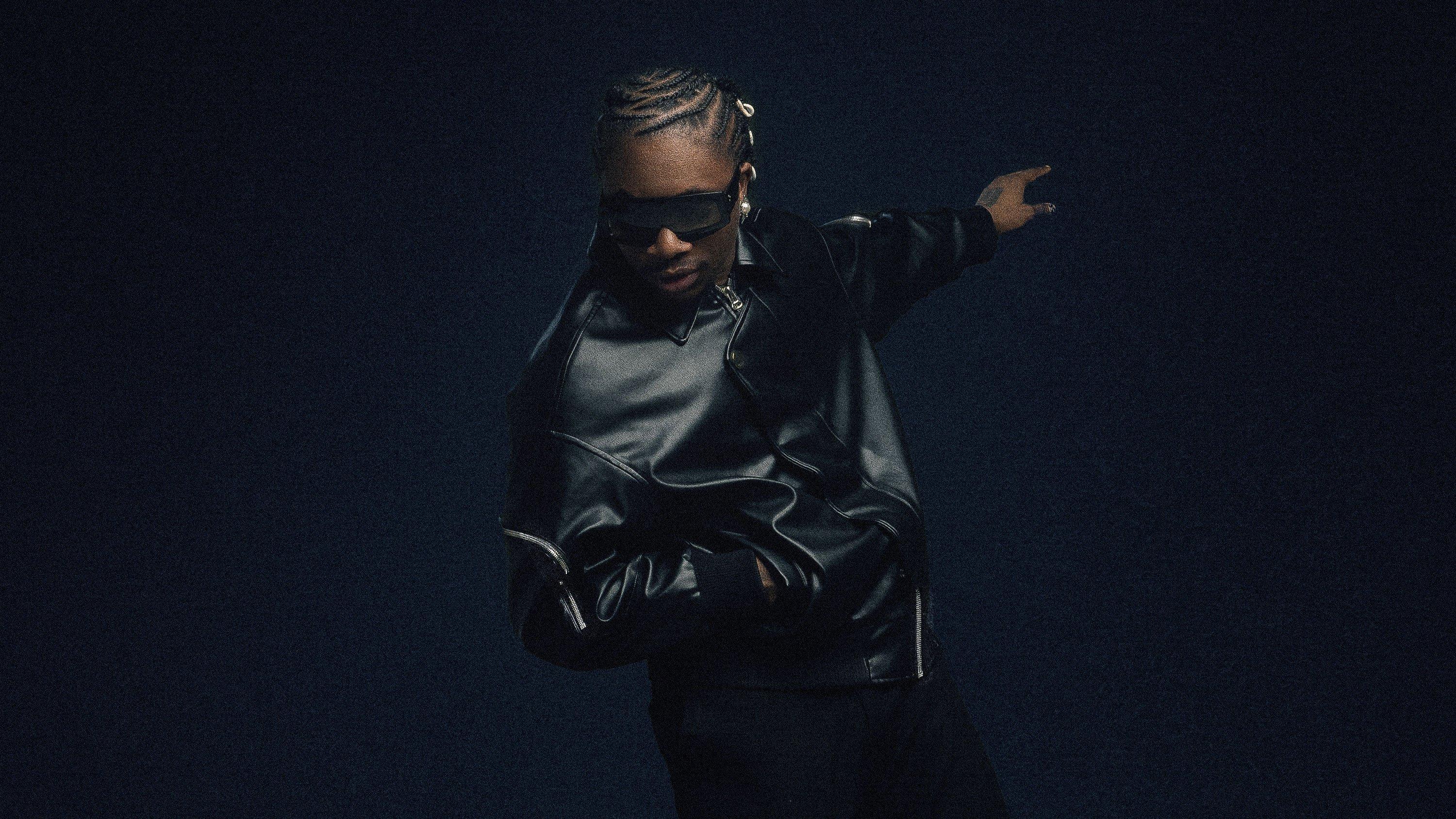
interview
Rising Afrobeats Star Oxlade Is Ready To Go Global On 'Oxlade From Africa'
The Nigerian singer discusses his new project, his global ambitions, and the unity of Afrobeats as an identity.
If there’s one thing Nigerian singer Oxlade believes in, it’s the power of Afrobeats as a world-conquering musical movement.
“Afrobeat is beyond the music. Afrobeats is who we are,” he says. “Afrobeats is the trends, the fashion, what we eat. Afrobeats is an identity.”
The Lagos native, born Ikuforiji Olaitan Abdulrahman, has good reason to believe in Afrobeats, considering he’s one of its fastest-rising stars. After a youth marked by tragedy and struggle, in particular the death of his mother at 3 years old, he left university to pursue a musical career in the late 2010s.
Oxlade quickly rose to prominence when his strong falsetto vocals earned him cosigns from Drake and opening performance slots for Davido and WizKid. His EP Oxygene, inspired by his own struggles with asthma, gained acclaim with the smash hit “Away” in 2020. An even bigger success followed with “Ku Lo Sa” in 2022; his performance of the song on A Colors Show, the influential YouTube series where artists give one-take live renditions of their music, currently has over 100 million views.
Now, Oxlade is readying his biggest act yet. He dropped his debut album Oxlade From Africa on September 20 ahead of a North American tour starting October 2 in Winnipeg. The album’s vision of what Afrobeats can be is quite inclusive, with the artist bringing aboard UK rapper Dave, French-speaking Congolese star Fally Ipupa, and Jamaican dancehall icon Popcaan as collaborators. Ugandan music legend turned political dissident Bobi Wine provides a spirited introduction on the album’s opening track.
GRAMMY.com caught up with Oxlade via Zoom ahead of the album’s release to talk about the creative process behind the record, his global ambitions, and how Afrobeats serves as a cultural force on the world stage.
How long have you been making music and when did you decide to start doing it professionally?
I started singing even before I started to talk. So it's more like a muscle memory thing for me. I was born into a musical family. I lost my mom when I was three, and I moved to my grandma's. My grandma happened to be a deaconess in a church, and she enrolled me in the choir. Ever since then, I've been singing. It has always been a part of me, even though I never knew I was gonna use it to impact lives. Even though I never knew I was gonna be Oxlade, I started singing even before I found myself.
Judging by the Barcelona FC jacket you’re wearing, you're clearly a football fan. Do you support any specific teams or players?
I'm a Barca fan. My favorite football player of all time is Neymar. He made me love football again. His game is artistic, not the normal athletic, direct style.
Before I knew the origin of your artist name, I originally thought that you had named yourself after (former Liverpool player) Alexander Oxlade Chamberlain.
Yeah, I get that a lot. Actually, I got it from my grandpa. He lost his best friend the same day I was born, and so he gave me the name in his honor.
**The album is called Oxlade from Africa. Why is it from Africa, not from Nigeria or from Lagos?**
As much of a Nigerian that I am, I'm equally an African. And Africa is the mother continent of every African country and race, including the likes of Jamaica and most of the Black people you see anywhere on Earth. So I felt like self awareness and identity is one of the most underrated strengths that any African has. I'm on the path of finding myself, but also I'm on the quest of telling people more about myself and where I come from through my music.
Something I encounter a lot when speaking with Afrobeats artists is the idea of Pan Africanism, this desire to sort of unite the whole continent through sound. And it seems like you want to unite sort of everyone of any Black experience.
I feel like we need more unity in Africa. God really blessed our race. And I feel the only missing piece is more love. If we let go of xenophobia, tribalism and personal greed, I feel like Africa could be the most blessed, flourishing continent to ever exist.
Is that why you wanted to work with someone like Bobi Wine, who has become a political leader in his country?
Yeah. I mean, it was just a way to remind the African youth that even though we are artists, we're vessels, and we are also destined to use our platforms and our voices to wake people up. The future is now, the future is tomorrow, the future has to start from now, and having Bobi Wine on there was just like a trigger to remind people of what the struggle of being an African youth feels like, and against all odds, how much we have to triumph. Because when our parents, or when the people that came before us are gone, we're going to be the ones that have to handle the fate of Africa.
Was there a particular moment earlier on in your career where you realized you wanted to become a musician full time? What was that moment like?
I just knew I was never going to work a nine to five (laughs). Like, in as much as I could work for someone, I want to work on my own terms. I want to work while creating my own future, my own art. I didn't know I was going to be this big or go this deep into music, but I knew I was going to be a star. I started off as a dancer, and then I started acting, and then music just came along. Music had always been there, but I really didn't know what exact talent I was going to use to actually push my stardom. But I feel like music eventually won, because I think that's the most natural thing that comes to me.
Is there a co-sign from another artist, or anyone really, that excited you more than anything other? Who's the most important supporter?
Every single human being that streams my music is my biggest co-sign. I would say Drake, but I mean, a woman somewhere in Congo taking out her hard earned money to stream my music is my biggest supporter, or the woman somewhere in the South of France using my songs to serenade her husband for their wedding anniversary. I feel like every single person that ever invested in my music should be regarded as my biggest co-sign ever.
What’s the biggest career milestone of yours so far? What is something that you are really proud to have accomplished
My biggest career milestone is the fact that I never stopped, that I'm still here, that I'm still trying to achieve my goals, regardless of all the obstacles, regardless of where I come from. Trust me, being a Nigerian alone is an obstacle, because we’re making it against all odds. We're doing this in hardship, in poverty, and we're still excelling. So being able to achieve my dream alone is my biggest milestone.
Were there any particular obstacles in the making of this album that you had to surpass?
Obstacles have to happen for you to value every success that you achieve, so from the paperwork down to me having to go re-record the entire album in London, down to selection problems, down to me having to let go of some personal, sentimental songs that didn’t fit the theme of the album, down to having sleepless nights, always having to push the album date, thousands of Zoom meetings – it's a long list. That's why I'm so grateful that this album exists.
What would you say the theme of the album is overall?
Royalty, African excellence, and Black is the new cool. Being Black is a flex. Afrobeat is beyond the music. Afrobeats is who we are. Afrobeats is a Twitter banter. Afrobeats is the trends, the fashion, what we eat. Afrobeats is an identity. So I understand when people try to carve a niche for themselves, but what I don't like is when it’s at the expense of Afrobeats, discrediting what we're fighting for, which is an identity. You wouldn't see Kendrick Lamar, no matter how many triple or quadruple entendres he might put on a record, try to downplay hip hop, because that's the identity they're trying to represent. So I feel like this album is just an embodiment of all of that, authenticity, originality.
**In terms of what you put into the lyrical content or the sound of the album, how do you think that identity manifests on Oxlade from Africa?**
I sang about my struggle. I sang about love, I sang about gratitude. I sang about prophesying greatness into one's life. Everything I am in real life was transferred into melodies, and that is why I feel like that is authentic enough to be labeled Oxlade from Africa and an African album, because I'm African, and I'm literally singing my experiences into music.
And those personal songs that you had to leave off, why exactly weren’t they right for this project? And are you going to try and put them out at some point?
Definitely, they're gonna fit into the project they were made for. Some of them were probably extremely pop records, and they defied the theme and sound that I was trying to create for this album. Some of them could be techno music. Some of them could be different types of genres that didn't fit the theme of the album, not because the songs were not good enough. So definitely, those songs are gonna find an album that benefits them.
Who would you love to collaborate with the most?
Dead or alive? Michael Jackson is a no brainer, because I feel like he's the greatest to ever do it. He made Black boys mainstream. I don't know if you understand what that means, like he’s the first Black pop artist to be televised on MTV. You know, all those types of milestones made boys like us, at home in Africa, believe that anything is possible. Another person I would like to work with is probably Drake. Him, Kendrick, Lauryn Hill, and the list goes on and on. There's Chronixx from Jamaica. I just love spiritual, ethereal musicians
What's one thing that people might not know about you?
I'm asthmatic. People don't know that. That's why I dropped my first ever project, an EP called Oxygene. People didn't realize it was me raising awareness for asthma patients around the world, to tell them they’re not alone and that music would be the air you need to heal you from asthma. I'm also a cat guy, I have two cats.
Does your asthma ever give you difficulties when performing?
Oddly enough it never has. I feel like the pressure and the intensity that comes with climbing the stage turns all sickness into hype. Like you're about to get onstage, nothing is messing you.
More News About African Music
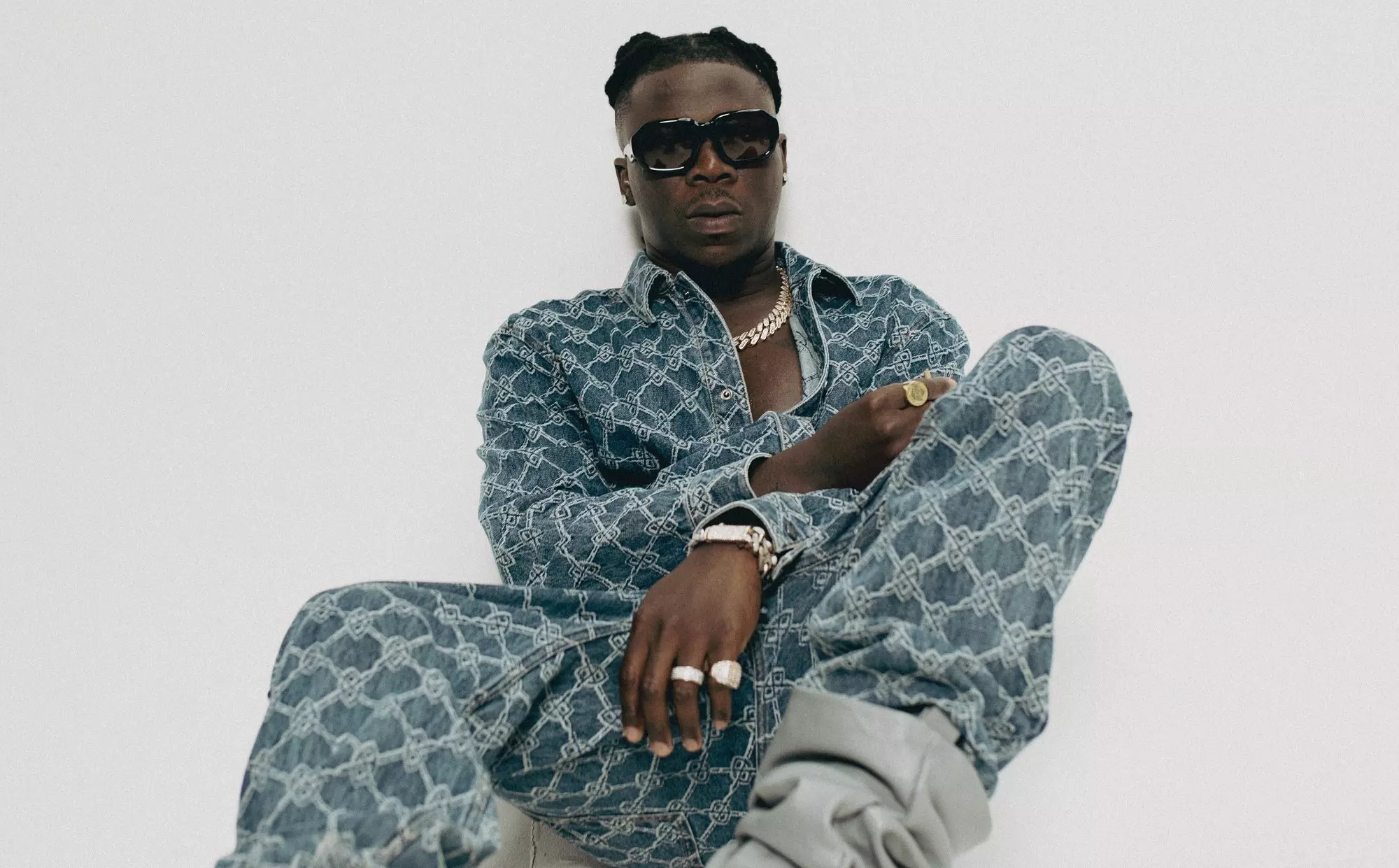
Stonebwoy On His "Inner Quest" To Showcase Authentic Ghanaian Sound

Mic Monsta Performs "Local Lokito" | Global Spin
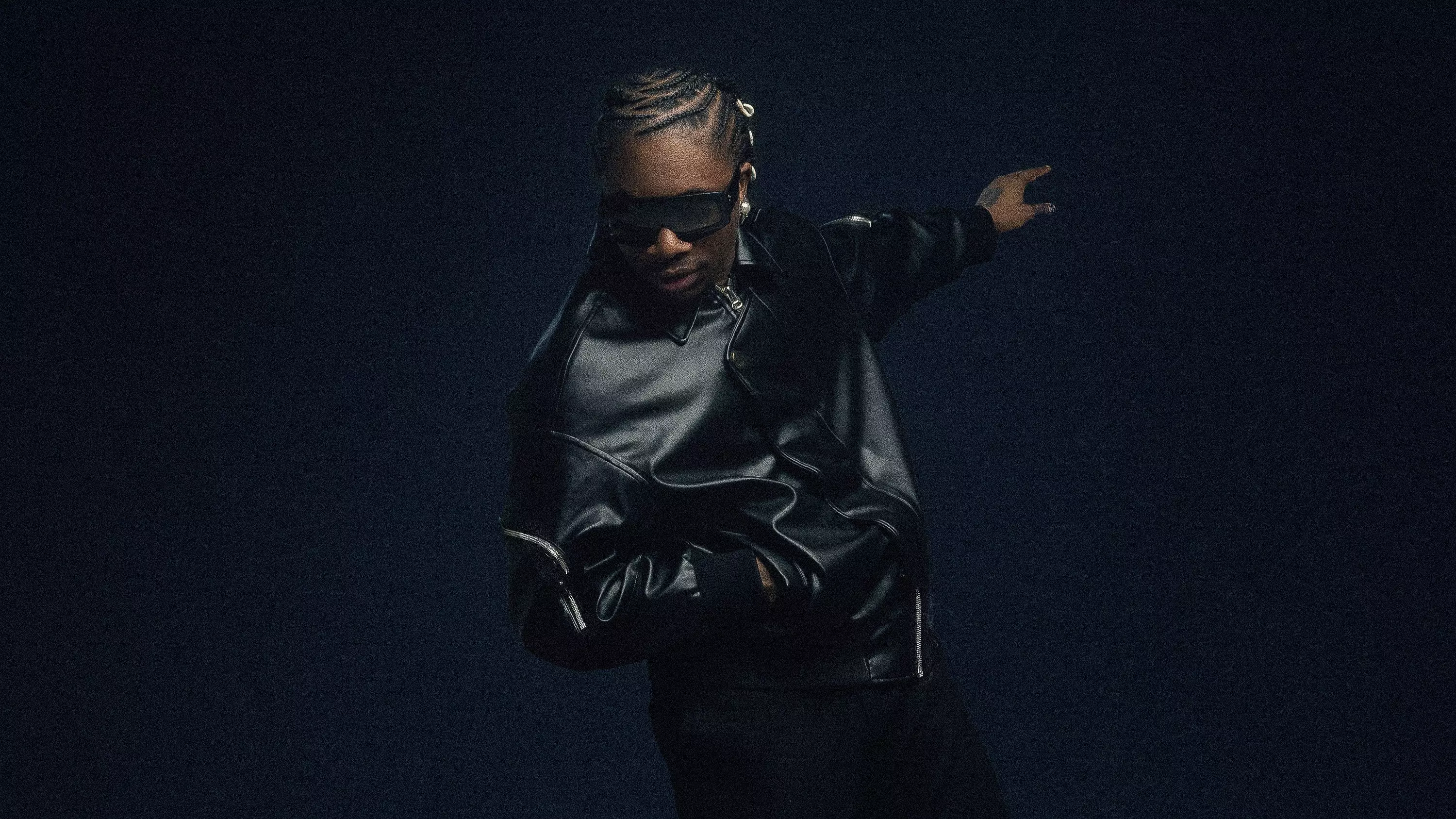
Rising Afrobeats Star Oxlade Is Ready To Go Global On 'Oxlade From Africa'
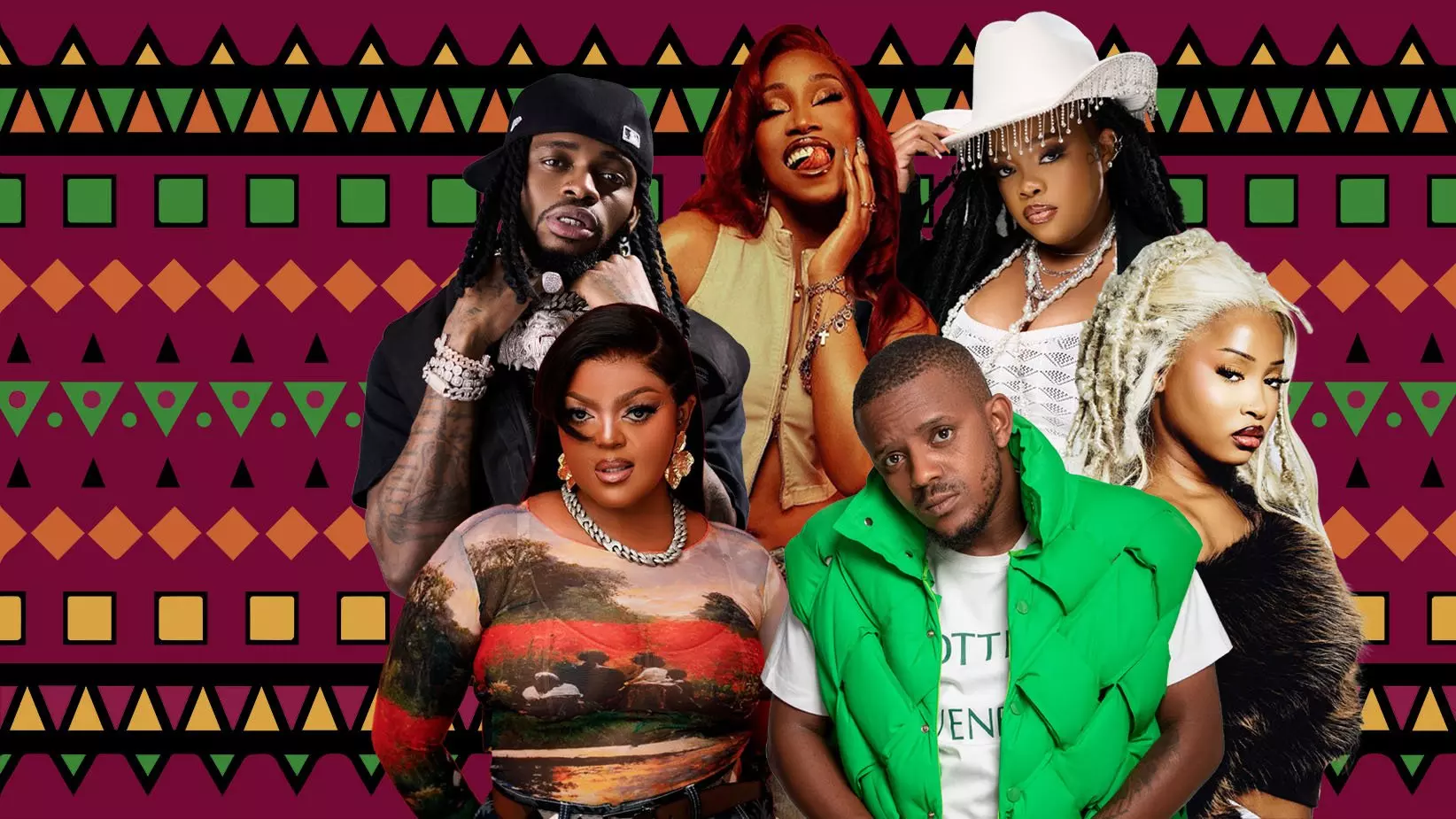
Amapiano's Decade-Long Journey To Global Dominance: The Sound Redefining Club Music Worldwide
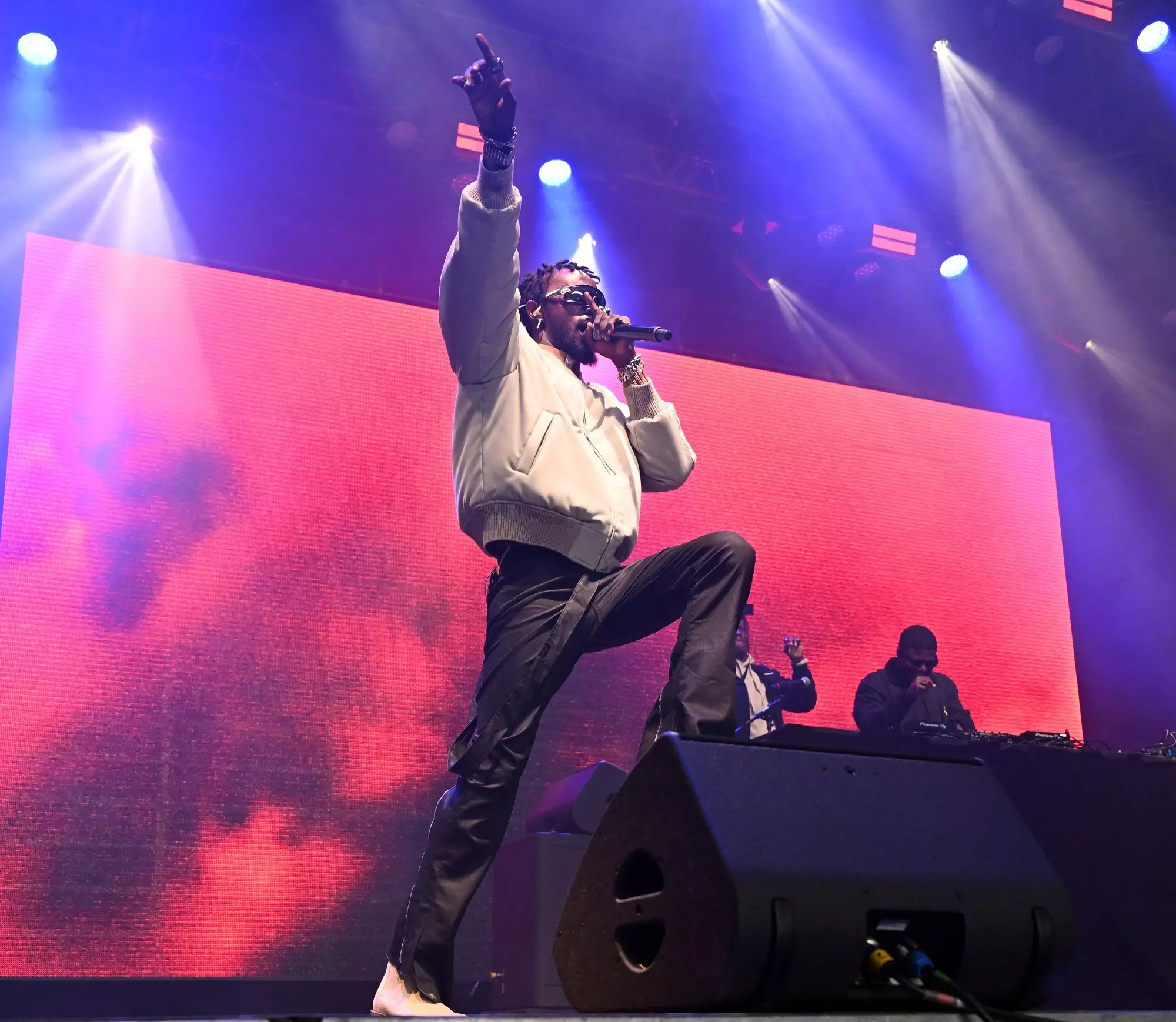
10 Artists Essential To Ghanaian Hiplife: Reggie Rockstone, Sarkodie, Mzbel & More
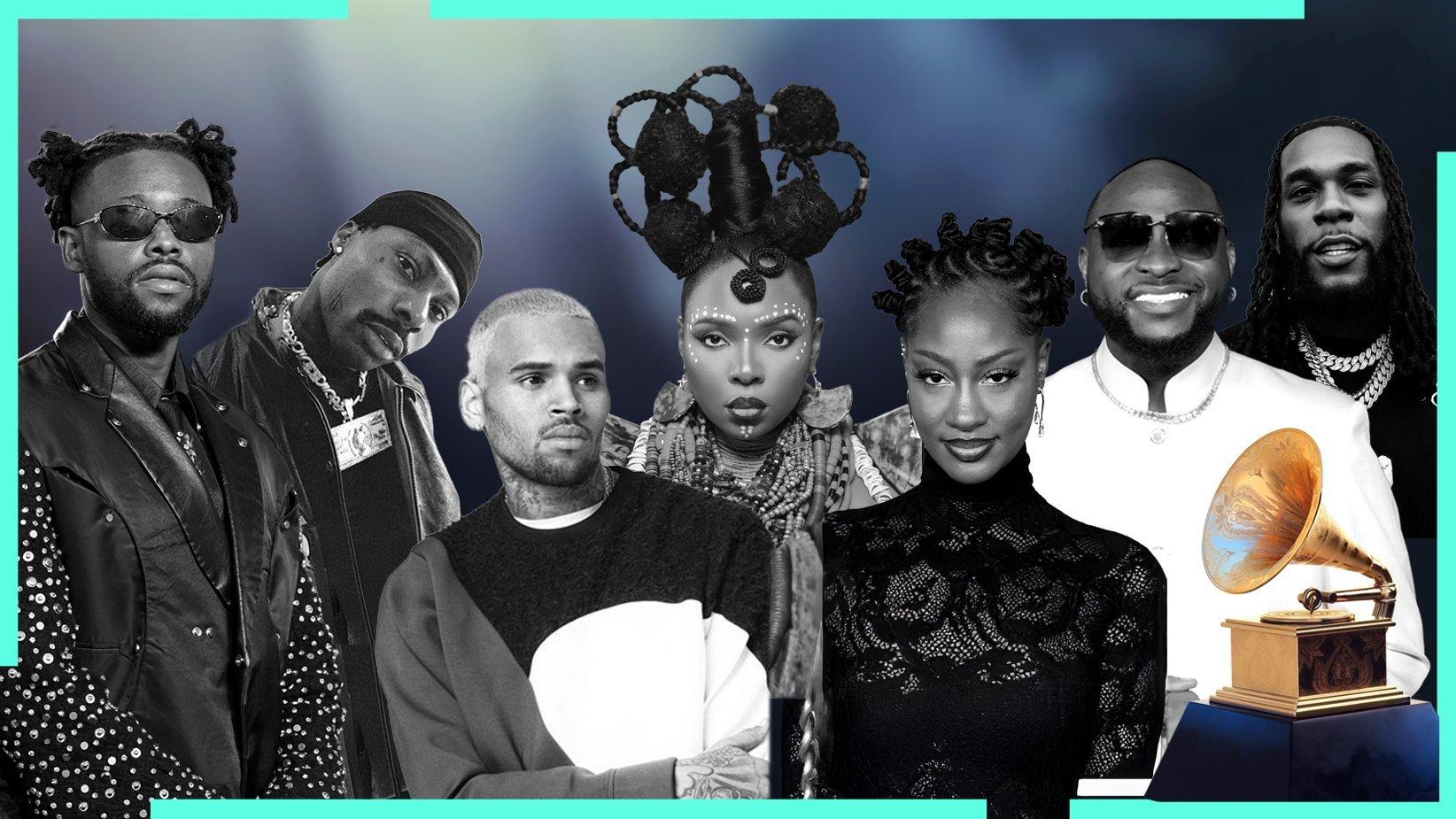
list
2025 GRAMMYs Nominations: Best African Music Performance Nominees
Burna Boy, Yemi Alade, Asake & Wizkid, Tems, and Chris Brown featuring Davido and Lojay are nominees in the second annual Category.
Earlier this year, the Recording Academy made history by awarding their first-ever GRAMMY Award for Best African Music Performance. Never before had the continent’s vibrant musical culture been given a category all their own, and the best and brightest from the African music industry stepped up to receive nominations.
The eventual victor was 22-year-old South African singer Tyla, whose bewitching song "Water" earned the hearts of GRAMMYs voters, as well as millions of listeners that boosted the song to the Billboard Hot 100. She became the first South African in 55 years to make the chart.
Read more: 10 African GRAMMY Winners Through The Years: From Miriam Makeba To Angélique Kidjo & Burna Boy
This year, Tyla will not defend her prize. But five fantastic songs from a multitude of artists, including one high-profile American that has joined up with two Afrobeats stars, will compete for the Golden Gramophone. Check out the nominees below and read the full 2025 GRAMMYs nominations list ahead of Music's Biggest Night on Sunday, Feb. 2, 2025.
Yemi Alade — "Tomorrow"
One of African pop music’ biggest stars, Yemi Alade would be a legend even without a GRAMMY nod. She first rose to fame a decade ago thanks to continental hits like "Johnny" and "Oh My Gosh" with Rick Ross. In July, she took her sound to new heights on Rebel Queen, an album incorporating genres such as highlife and dancehall for a global celebration of Black music that solidifies her reputation as "Mama Africa."
"Tomorrow," the GRAMMY-nominated song from the album, is a triumphant, bright amapiano tune, the latest result of Alade’s flirtation with the genre. Produced by Yasso and incorporating choral vocals, the lyrics in English and Nigerian Pidgin assert the singer’s unflappable confidence and self-belief. "I dance away my sorrow," she sings, "Rain or shine, I’ll be shining like a diamond."
"Tomorrow" marks the legendary artist’s first-ever GRAMMY nomination, but whether or not she grabs the golden gramophone, it’s clear from her song that nothing will phase this Rebel Queen.
Burna Boy — "Higher"
Burna Boy is such an undisputed force in African music, it’s not surprising for him to be nominated in this Category two years in a row. Already a GRAMMY winner for Best Global Music Album (Twice As Tall took the prize in 2021), his bold, American R&B-inspired "City Boys" earned a Best African Music Performance nod last year and was among a medley of tracks Burna performed on the GRAMMY stage. The braggadocious hip-hop song ultimately fell to Tyla’s "Water," however.
The success of his 2023 album I Told Them may have put Burna Boy in a more contemplative state of mind, because "Higher," his current nominated track, is a much more conscious effort. Over a mellow, amapiano-inspired beat from producer Yo Dibs, Burna reflects on his limited time on Earth and the harshness of daily life: "You know say streets don't love you rara / It's full of snakes and spiders / Make a wrong move, lose your life / Make it hard for your mother to sleep at night."
The song’s video, conceptually similar to Drake’s visual for "God’s Plan," shows the singer making an emotional visit to his hometown of Port Harcourt and distributing aid with his charity group Project PROTECT. It seems that magnanimity has already been rewarded: The song gained 1.3 million streams on Spotify in its first day of release, a new record for an African artist, and its video has been viewed over 7.3 million times as of this writing.
Chris Brown — "Sensational" feat. Davido & Lojay
It can’t be denied that Chris Brown is something of a survivor in the music industry. The GRAMMY winner for Best R&B Album (F.A.M.E.) is as famous for his hits — from "Run It!" and "Kiss Kiss," to "Look at Me Now" and "No Guidance" — as he is infamous for his checkered past.
Now he’s back in the GRAMMY spotlight with a single from his 2023 album 11:11. "Sensational" marks a bold stylistic pivot for the R&B singer as he adopts Afrobeats for a slick song that could be called, well, "breezy." Adding some African bona-fides, he’s recruited Davido — one of the genre’s most important acts and a GRAMMY nominee last year in this Category — as well as rising artist Lojay, for feature verses. The result is a transatlantic collab that makes the case that Americans can take on African genres too, with a little help from their continental friends.
Asake & Wizkid — "MMS"
In just a few short years, Asake has established himself as one of the most creative and charismatic new talents in Afrobeats. His 2023 record Work of Art blended the globally-aspirational Nigerian pop sound with South African house offshoot amapiano and the indigenous Yoruba genre fújì; Asake earned a GRAMMY nod in this category for album single "Amapiano" last year.
Asake isn’t one to rest on his laurels, however. He dropped another record, Lungu Boy, earlier in 2024, for which he switched up his sound further and recruited global stars like Stormzy, Central Cee, and Travis Scott. Single "MMS" keeps things refreshingly local in terms of guest spots, recruiting GRAMMY-winner Wizkid for the feature. Incorporating the same Yoruba-language choral vocals Asake used throughout his last album, he trades verses with Wiz over a glamorous, jazz-inflected, ‘90s R&B-inspired beat by P.Priime. The lyrics, in English, Yoruba, and Nigerian Pidgin, narrate Asake’s journey to finding his signature sound and letting fate determine his path. It’s a classy, reflective song from a pair of Africa’s biggest stars.
Tems — "Love Me JeJe"
Tems is already a GRAMMY winner and the first African artist to top the Billboard Hot 100, all thanks Future sampling her song "Higher" on his hit "Wait For U." Yet 2024 was the year in which the Nigerian artist stepped into her own spotlight, finally releasing her debut album Born in the Wild. Its single "Love Me JeJe" hit No. 1 on the UK Afrobeats charts and No. 3 on Billboard’s U.S. Afrobeats Songs.
Interpolating an identically-titled 1997 hit from Seyi Sodimu that’s regarded as an African pop classic, "Love Me JeJe" is an Afrobeats tune as tender as the Pidgin phrase that makes up its title. Tems’ smooth, heartfelt vocals float over the track as she sings of her desire for unconditional, supportive love: "I need your lovin’, so fresh, so clean / Love me in and out, unfailingly / And I’ll be down now, anytime you call me."
Debuting the song during her set at Coachella 2024, it could be argued that "Love Me JeJe" was meant to provide American audiences with a bridge to African music, from its past icons to its present talents. With her GRAMMY nod for the song, it seems that Tems has done just that.
More News About African Music

Stonebwoy On His "Inner Quest" To Showcase Authentic Ghanaian Sound

Mic Monsta Performs "Local Lokito" | Global Spin

Rising Afrobeats Star Oxlade Is Ready To Go Global On 'Oxlade From Africa'

Amapiano's Decade-Long Journey To Global Dominance: The Sound Redefining Club Music Worldwide

10 Artists Essential To Ghanaian Hiplife: Reggie Rockstone, Sarkodie, Mzbel & More
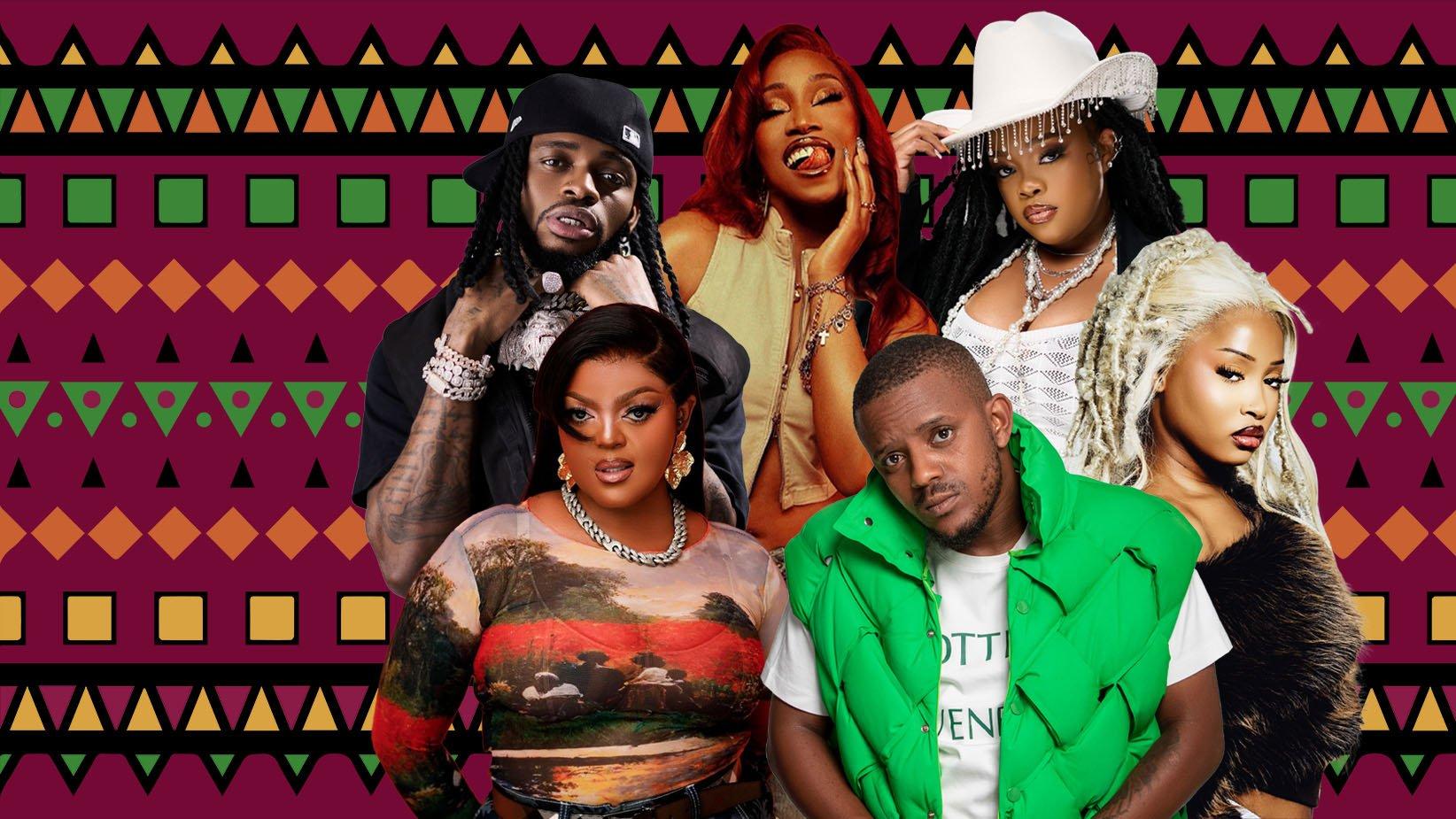
Photos: Blaq; Jibril Jallow; Malwandla Rikhotso; Mishaal Gangaram; Malwandla Rikhotso; Minenhle Nene
feature
Amapiano's Decade-Long Journey To Global Dominance: The Sound Redefining Club Music Worldwide
Amapiano may have started in the townships of South Africa, but it didn’t stay there. Amapiano artists Kabza De Small, Uncle Waffles, DBN Gogo, and others detail how the genre went from the underground to the GRAMMY stage and beyond.
At nightclubs in Tokyo, New York and beyond, pulsing through the speakers at major European music festivals, and even in Hollywood blockbusters, one sound has been steadily taking over: amapiano.
The South African genre, with a blend of deep house, jazz, lounge and local musical styles, has captivated the world, generating billions of views on social media and sparking a cultural phenomenon that shows no signs of slowing down. On TikTok alone, the #Amapiano hashtag has amassed over 10 billion views, a testament to its global reach and popularity.
Characterized by velvety, hypnotic grooves, piano melodies, deep basslines, and smooth percussive rhythms, amapiano was born in the townships of Gauteng Province — particularly in cities like Pretoria and Johannesburg — in the mid-2010s. Slower than the average club track, amapiano songs often live between 110 and 120 bpm. The genre's rise to global dominance is a testament to the power of grassroots creativity and digital connectivity.
Fast-forward to February 2024, and South African singer Tyla took home the inaugural golden gramophone for Best African Music Performance at the 2024 GRAMMYs. Beyond Music's Biggest Night, Tyla's amapiano-infused Afropop hit "Water" topped the Billboard U.S. Afrobeats Songs and Hip-Hop/R&B charts, and became the first African song to enter the Billboard Hot 100 since 1968. The "Water" dance challenge on TikTok — created by Tyla’s choreographer, Litchi — also widely pushed the song.
Tyla isn't alone in pushing the genre's popularity. Interest in amapiano has been propelled by social media and streaming platforms. According to Spotify data, the genre garnered its first 100 million streams in 2020; by mid-2024 the platform reported 855 million streams of amapiano songs. Between 2014 and 2024, there has been a 153 percent growth in international exposure to the genre.
While Tyla’s win at the GRAMMYs and in wider culture affirms the genre’s solid footing in the global music scene, amapiano’s popularity is the result of a decade-long journey.
The Birth Of A Movement
While the birth of amapiano is generally pegged to 2014, there’s no specific event or single person that can be credited with its uprising. Amapiano's origins were humble but innovative, distinguished by its inclusivity and collaboration — factors that are likely the result of the fluidity with which the genre emerged.
Young, aspiring producers in South African townships used affordable personal computers and free music production software to blend globally-influenced sounds such as deep house and jazz with kwaito — a distinctly South African genre. True to the collaborative nature of the genre's origins, an amapiano song can have six to 10 collaborators (sometimes more); the result is a blend of carefully curated voices, notes, and themes that captivates listeners far beyond its birthplace.
Kabza De Small began his career in 2009 and broke through on the continent with his 2016 album Avenue Sounds. Today, he's hailed as the "King of Amapiano" by media, fans and industry peers. "Amapiano is considered a raw, rough sound. To see people globally dancing and participating in TikTok challenges is thrilling," he tells GRAMMY.com, reflecting on amapiano's unique sound and present-day virality.
This rawness is largely reflected in the genre’s production, which often strips down tracks to their bare essentials. Repetitive beats and bass often contribute to amapiano's "rough" aspect, making it feel more direct and visceral. Soulful melodies float over that heavy bass and percussion, and catchy vocal hooks balance the raw beats underneath.
Amapiano’s collaborative nature has been crucial to its development. Kabza De Small shouts out pioneering producer, singer and songwriter, Mdu aka TRP. "Not a lot of people know that he basically founded the log drum sound that is so essential and distinct" to amapiano, De Small says. In amapiano, the "log drum" isn't an actual instrument but a distinct, synthesized bass sound that captures the deep, resonant tones of a traditional log drum. This signature sound has become a cornerstone of amapiano's unique and captivating vibe.
From Local Phenomenon To National Breakthrough
Cultural authenticity has been a key factor in the sound's appeal. It's not just a genre of music, but a representation of South African identity and expression. The name itself came from the Zulu language, which is the word for "pianos."
By 2016, amapiano was still finding its ground, with local DJs and producers refining its signature elements.
Learn more: 11 Women Pushing Amapiano To Global Heights: Uncle Waffles, Nkosazana Daughter, & More
A significant milestone was achieved in 2017 when De Mogul SA's "Oe Batla Kae" became one of the first amapiano tracks to achieve commercial success. The tune got the artist booked for local shows, effectively paving the way for other amapiano songs. In 2018, "Umshove" by Kabza De Small feat. Leehleza showcased a more refined amapiano sound, highlighting elements that "Oe Batla Kae" lacked — particularly the log drum.
2019 was a defining year for amapiano, as songs like "Labantwana Ama Uber" by Semi Tee (feat. Kammu Dee and Miano), "Vula Vala" by DJ Maphorisa and Kabza De Small (feat. Nokwazi and Vigro Deep), and "Kokota Piano" by Kaygee Daking and Bizizi further left the underground. Amapiano could be heard on television and radio, in clubs, and across social media, effectively making the above songs anthems throughout South Africa.
As the sound began to spread nationally, it carried with it the stories, language, and rhythms of its birthplace, creating a strong connection with listeners across the country.
The Global Takeover
As the world grappled with COVID-related lockdowns in 2020 and 2021, danceable amapiano songs such as DBN Gogo and Musa Keys' "Possible," Focalistic's "Ke Star" feat. Vigro Deep, and "Emcimbini" by Kabza De Small and others provided a much-needed escape. With more time spent online during the pandemic, the genre was simultaneously making its way into social media globally, with a variety of TikTok dance challenges bringing additional listeners to the genre.
International collaborations further catapulted amapiano onto the world stage. In 2022, Nigerian crooner CKay collaborated with Davido and Focalistic on "Watawi", a notably huge Afropiano song. On YouTube, the songs performed quite well, with "Woza" by South African artists Mr JazziQ, Kabza De Small and Lady Du featuring Boohle hitting 21 million views. "Mang’Dakiwe" by DJ Obza featuring Leon Lee hit 17 million views. The remix, done in collaboration with Tanzanian bongo artist Harmonize garnered 29 million views.
By 2023, the amapiano sound was now mature and definitive, with all of its key elements together. Over the next few years, amapiano sounds would be incorporated with genres from other countries to great effect.
Zimbabwean amapiano vocalist Sha Sha's "Tender Love" feat. DJ Maphorisa and Kabza De Small garnered more than 15 million views on YouTube. The popular release showcased her impeccable vocal range and denoted that amapiano was now being done by artists beyond South Africa. For her efforts, Sha Sha took home the Viewer’s Choice Best New International Act award at the 2020 BET Awards. Her win on an international platform signaled amapiano's arrival on the global music scene and opened doors for more artists to gain international exposure.
Simultaneously, awards for and documentation of amapiano within South Africa pushed the movement even further. In 2021, the South Africa Amapiano Music Awards were launched and exclusively dedicated to the genre. The inaugural Best Amapiano Album Of The Year Award was given to De Mthuda for Ace of Spades.
Uncle Waffles, whose electrifying DJ sets have made her a symbol of the genre's youthful exuberance, marvels at this global embrace. "It's amazing to see the world embrace a new sound," she tells GRAMMY.com. "Seeing people dancing and singing to the songs never fails to stun me."
Amapiano artists including Uncle Waffles, DBN Gogo, and Major League Djz have performed on a variety of global stages, from AfroNation's Portugal and Miami events to Coachella and London's O2 Arena. Tyla has performed at the BET Awards, the 2024 Olympics and the Cannes Lions Festival 2024.
Encouraging Cross-Cultural Collaborations
Amapiano has become a cultural ambassador, allowing artists in the diaspora to connect with their roots while introducing the sound to new audiences.
Amapiano singer Nqobilé Danseur, who grew up in South Africa before moving to the UK at age 12, tells GRAMMY.com that "amapiano is deeply personal to me as it embodies my South African heritage and journey. Growing up in South Africa, kwaito was the soundtrack to our lives."
The genre's authentic DNA has allowed artists to explore new territories, both geographically and creatively. Nqobilé recounted her 2022 single "Shake" featuring Xavier being played during a carnival party in New York, and how the crowd's engagement reflected amapiano's ability to transcend cultural and physical boundaries.
Singer/songwriter Boohle, who transitioned from gospel and Afropop to amapiano, has toured Dubai, Amsterdam, and many African countries. "Seeing cultures and backgrounds unite over the music we make is something else. I would call it God's plan," she tells GRAMMY.com.
This international appeal has seen the rise of crossover subgenres such as Afropiano (Nigeria), bongopiano (Tanzania), Gqom 2.0 (South Africa), and bique (Mozambique). Afropiano tracks have garnered hundreds of millions of views on YouTube as of 2024. Among the largest hits are Kizz Daniel and Tekno's "Buga," Spyro's "Who is Your Guy" remix feat. Tiwa Savage, and "Unavailable" by Davido feat. Musa Keys.
Diamond Platnumz, a Tanzanian bongo artist, is a prolific contributor to the amapiano genre. "Tanzania has a very close relationship with South Africa from years back established with our forefathers," he says, adding that he also has family in South Africa. "I spend a lot of time there between business and family obligations. It was a natural thing for me as a creative to infuse what I was hearing on the ground in SA with what we are accustomed to in Tanzania."
Platnumz's amapiano catalog is impressive, with songs such as "Iyo", "Shu!", and "Nitongoze." He has collaborated with the genre’s heavyweights including rapper Focalistic, choir Mapara A Jazz, and the late Costa Tich. His 2024 amapiano single "Komasava" remix is an international collaboration that featured Khalil Harrison, Chley, and Jason Derulo.
The track, rich in amapiano beats, layered with modern pop elements, and Zulu, Xhosa, French and Swahili lyrics, exemplifies how the genre has become a bridge between artists from different parts of the world.
Cultural Impact Beyond Music
As amapiano spread globally, it began to influence fashion, dance, and broader culture.
The genre's success has also opened doors for African artists to venture into arenas outside of performing music. Kabza De Small created PianoHub, a record label which houses South African amapiano artists including Young Stunna, Mdu aka TRP, Nkulee & Skroef28, Deeper Phil, Masterpiece TVK, and Stakev. De Small added that he plans to open a venue called Piano Hub Soweto — another example of how amapiano has created economic opportunities and fostered community development.
DBN Gogo echoes this sentiment, adding that amapiano has broadened the horizons for many in the industry. "Outside of music, I think my team and I have been grateful for the opportunity to travel and see the world," she says. "Whenever we do have the opportunity we take time in different countries to immerse ourselves in the dance culture there. Amapiano has done so much in giving us and many others the chance to represent South Africa and the genre worldwide."
The success of amapiano has boosted Nqobilé Danseur's confidence, affirming her authenticity and driving her to release music consistently. Diamond Platnumz adds that he has become more aware through his involvement with amapiano, making his life's purpose even more meaningful. This July, DBN Gogo became the first amapiano DJ to perform at Belgium's Tomorrowland festival.
Even Beyoncé has taken notice: Uncle Waffles' debut single "Tanzania" was featured during a dance break on the European leg of the Renaissance World Tour.
Looking To The Future
As amapiano enters its second decade, its influence shows no signs of waning. The genre continues to evolve, with artists experimenting with new sounds and collaborations that push its boundaries.
Going forward, listeners can expect to see amapiano artists continuing to team up with global stars, experimenting with sounds that cross genre boundaries, from Afrobeats to electronic dance.
In October 2023, DBN Gogo collaborated with veteran Italian EDM DJ and producer Benny Benassi on a track titled "SAdesFakSHen." In June 2024, Chris Brown released "Hmmm," an Afropiano song featuring Davido. The song, which is part of his 11:11 album now has over 14 million views on YouTube by the time of this publication. Previously, Chris Brown appeared on the "Monalisa" remix, an Afropiano hit by Nigerian singer Lojay and producer Sarz.
"Tshwala Bam" by TitoM and Yuppe is another 2024 amapiano hit that saw Burna Boy jump on a remix. The song spawned a massive TikTok challenge, which got Tyla dancing with famed streamer Kai Cenat, while Khabi Lame joined in on the challenge, and Jason Derulo collaborated with popular twins Laurent and Larry Bourgeois on the dance.
Despite its success, amapiano faces challenges as it continues to grow. Maintaining its cultural authenticity while appealing to a global audience is a delicate balance. There's also the question of how to ensure that the pioneers and grassroots creators of the genre continue to benefit from its global success.
Boohle envisions a bright future for the genre. "Seeing the world jamming to amapiano is a dream come true for me as a young musician in South Africa," she says. "Remember, we come from a background of apartheid and oppression. Seeing cultures and backgrounds unite over the music we make is something else."
The story of amapiano is still being written, with each new release, collaboration, and dance challenge adding a new chapter to this remarkable musical journey. As it continues to evolve and inspire, one thing is certain: The amapiano revolution is far from over – it's just getting started.
Latest News & Exclusive Videos

Khatia Buniatishvili Plays "Mephisto-Waltz No.1"
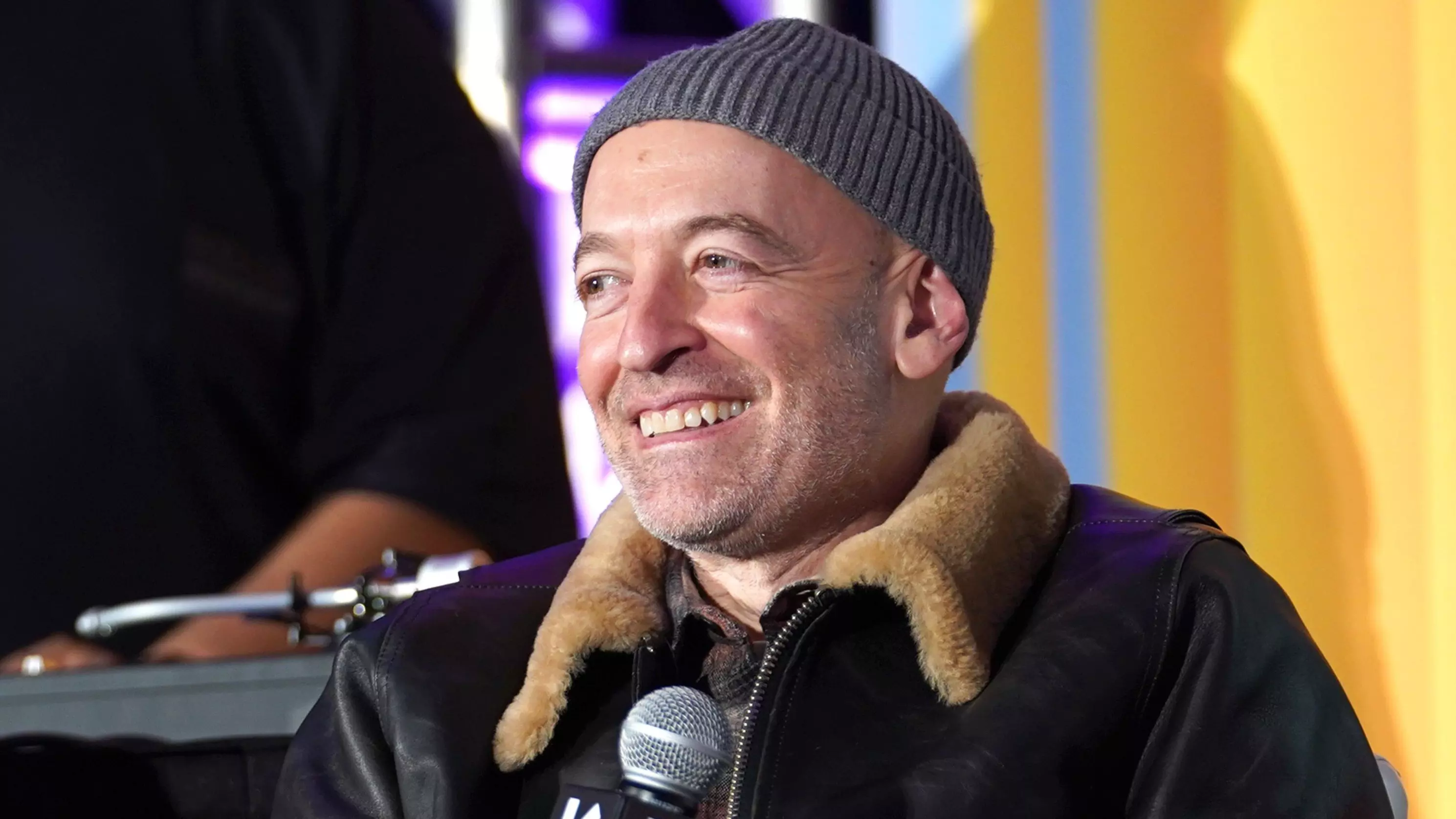
Peanut Butter Wolf Talks New Campus Christy Album & What's Next For Stones Throw

Warner Music Group's Paul Robinson To Be Honored With 2025 Entertainment Law Initiative Service Award

Your Vote, Your Voice: 6 Reasons Why Your GRAMMY Vote Matters

JOHNNYSWIM Reveal The Mic That Defines Their Sound
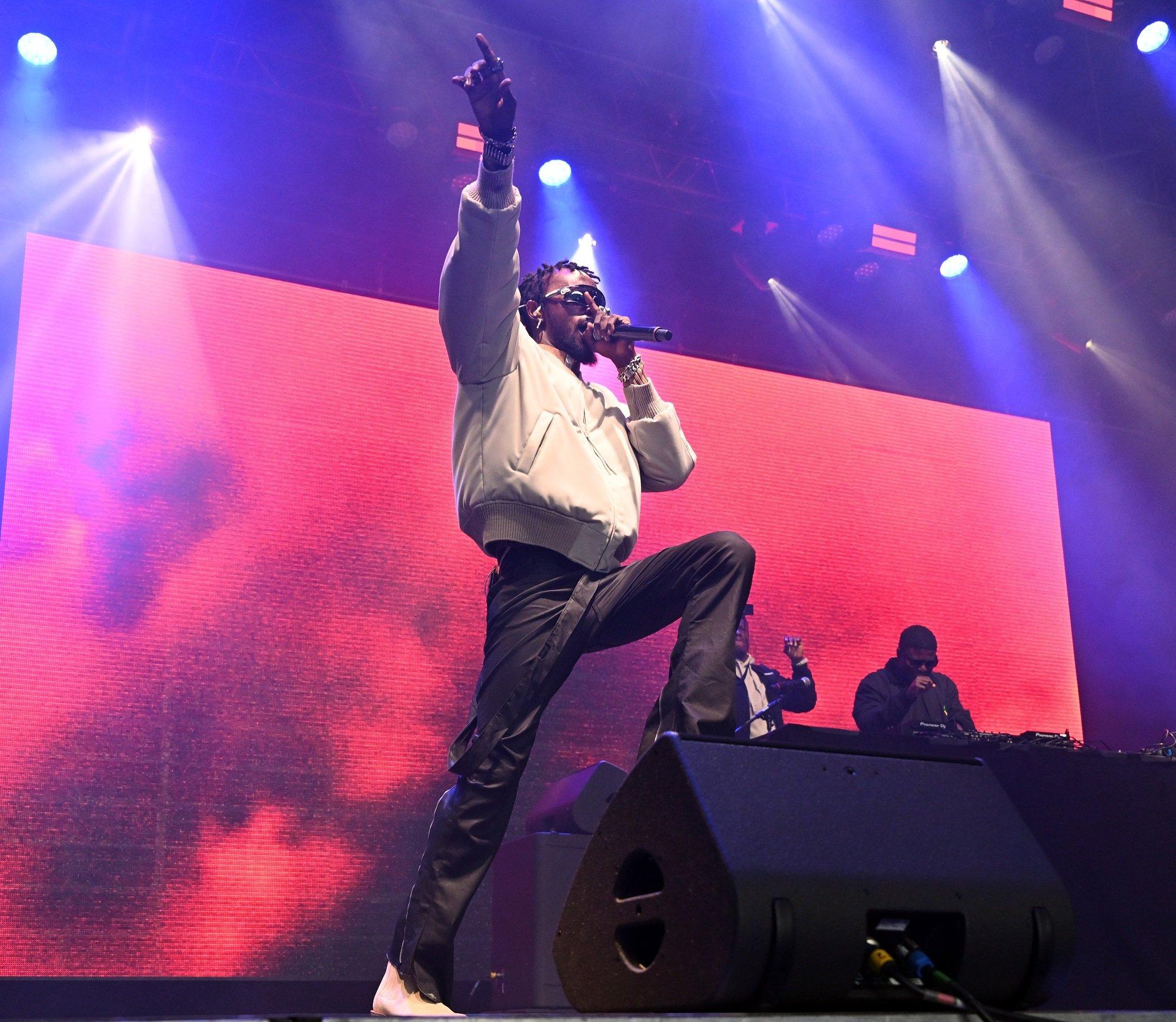
Photo: Rune Hellestad - Corbis/Corbis via Getty Images
list
10 Artists Essential To Ghanaian Hiplife: Reggie Rockstone, Sarkodie, Mzbel & More
In the 1990s, artists and producers from Accra merged the sound and aesthetic of American hip-hop with their Ghanaian sounds and culture. The resulting genre, hiplife, significantly influenced the music coming from Ghana and the African continent.
Ghana has been home to some of the most recognizable musical exports from the African continent, contributing heavily to the globalization and development of the continent's sound. While highlife is regarded as the country’s biggest sonic export, the introduction of hiplife some 30 years ago invigorated the Ghanaian music scene and birthed some of the country's most important artists.
Hiplife music blends hip-hop from the West with Ghanaian highlife sounds like Jama and Kpanlogo — a sound and dance by the Ga people, who make use of nono (metal bell), fao (gourd rattle), and local drums to play beats. These elements were fused with funk, bass, and boom-bap to create hiplife. Hiplife and hip-hop have aural similarities and both use rapping; both genres also reflect a larger culture.
While Gyedu-Blay Ambolley is considered one of the earliest rappers, as demonstrated on his 1973 song "Simigwa-Do," the term "hiplife" was only coined in the late 1990s by genre pioneer Reggie Rockstone. Still, American hip-hop had arrived in the Ghanaian capital of Accra by the early '90s and local rappers began to release their own music soon after. Duo Talking Drum were among this early cohort, and their single "Aden" was an underground hit in 1993.
As a movement and culture, hiplife is also an identity, created to encourage people to be daring in their exploration of sound. Pioneering hiplife artists like Root Eye Samini and Shatta Wale (then known as Bandana) fused dancehall and highlife in the early 2000s to make music which could connect with local audiences.
Collaborations between artists and producers have been crucial in defining the sound, evolution, and amplification of hiplife. Just as hip-hop has developed a plethora of subgenres, hiplife has birthed other sounds such as azonto and asakaa. An offshoot of asakaa, Ghanaian drill, was among the elements in the new Best African Music Performance Category at the 2024 GRAMMYs.
The story of hiplife includes many important producers, artists and labels, including Kassa Records, DJ Rab, Zapp Mallet, Akyeame, Panji Anoff, JayQ, Hammer, Ex Doe, Chicago, and Okomfour Kwadee. Going forward, the mantle will fall on artists like TicTac, Abrewa Nana, Appietus, and much later a younger generation including Asem, Richie Mensah, and Beeztrap KOTM continue to amplify hiplife. Afrobeats artists have also taken notice; Tic Tac and Tony Tetuila’s "Fefe Ne Fe" was sampled on the 2019 song "Gbese" by DJ Tunez feat. Wizkid and Blaqjerzee.
With African music continuing to gain global recognition, the rich sounds emanating from the African continent are ripe for exploration. Read on for 10 artists who have been essential to the story of hiplife music.
Reggie Rockstone
Reggie Rockstone is regarded by many Ghanaians as the godfather of hiplife, having paved the path for many to pursue rapping as a career. Working with producers like the late Rab Bakari (DJ Rab Bakari), Reggie set the ball rolling for hiplife through songs like "Tsooboi."
His 1997 album Makaa Maka offered an early template for the sound, fusing Western-influenced hip-hop with traditional Ghanaian highlife sounds. The linguistically adept Reggie Rockstone — a Ghanaian boy who was raised in the UK and New York — rapped in both English and impeccable Ghanaian Twi to the shock and admiration of many. By this singular act, he proved that it was cool to rap in your own dialect and not necessarily in English, like American rappers of the '90s.
Reggie's will to make Ghanaian rap music stand out via releases like Me Na Me Kae, and Me Ka did not go unrewarded. He also scored hits with his singles "Keep Your Eyes on the Road," "Plan Ben," and "AH." He has also collaborated withdancehall giant Beenie Man and Nigerian legend 2Face.
Lord Kenya
Lord Kenya rose to fame when he joined Slip Music, one of Ghana’s celebrated music labels of the late '90s and mid-2000s. His musicality was undeniable, and his hardcore rap style was adored by many for its energetic flow and delivery. Likened to Tupac Shakur, Kenya was very direct whenever he was on the mic. He never shied away from any lyrical battle thus earning him the title "rap heavyweight." His swagger on and off the mic made him a star, with many eager to catch him anytime he performed.
Lord Kenya's street affinity, coupled with great stage performances, left a mark on Ghanaian audiences. His albums — including 1998's Sika Card, Yesom Sika, and Sika Baa — solidified his position as one of hiplife’s most important artists. Kenya's hit singles "Enyomo," "Medo" and "Sika Mpo Mfa Neho" as well as his verse on the late Daseebre Dwamena’s song, "Kookoo" ushered in a street approach to the rap scene, as seen in the careers of rappers like Kwaw Kese and Kweku Smoke in later years.
Obrafour
Revered, celebrated, and crowned by music rap purists in Ghana as "Rap Sofo" (high priest of rap), Obrafour influenced multiple generations of rappers in Ghana. The artist first gained popularity in the late '90s with his cadence and mastery over his mother tongue, Twi, as well as his storytelling, lyricism, and wisdom.
Obrafour’s flow complemented the work of legendary producer Hammer, who brought hard-hitting drums, horns, and legendary sharp chords to Obrafour’s 1999 album Pae Mu Ka. The album is regarded as the bridge that connected older audiences who dismissed hiplife as a passing fad and the youth, who regarded hiplife as the future of Ghanaian music. Today, Pae Mu Ka is as important to hiplife as Nas’ Illmatic is to hip-hop.
Pae Mu Ka was the first of several collaborations between Obrafour and Hammer. Together, they created a sound that would influence generations of rappers. Obrafour is held in high regard by rappers such as M.anifest, Guru, Ko-Jo Cue, and Pappy Kojo.
VIP
Established in Nima, a suburb of Accra, VIP underwent significant personnel changes but never let their commitment to hiplife music falter. Original member Friction later onboarded Promzy, Prodigal, and Lazzy (who later changed his name to Zeal), and Bone championed the vision of the group for over a decade (as well as the departure of Friction, Bone and Promzy).
Backed by the group's diverse personalities, VIP quickly became one of the biggest music exports of the country, winning six awards at the Ghana Music Awards in (2004), including Song Of The Year for the 2003 hit title track "Ahomka Wo Mu." Over a two-decade period, the group released albums and scored several hits and collaborated with some of the continent's finest, including 2Face, Patoranking and a host of others. Vision in Progress (VIP) epitomized the cultural ethos of hiplife: raw energy, passion and talent.
When Reggie Rockstone, a longtime admirer of the group, arrived in 2014, the group became VVIP. The group’s success would be further cemented as they crossed over into Nigeria and other parts of the world. "Ahomka Wo Mu" has been sampled and interpolated by various musicians, including songs by MUT4Y & Wizkid and Kida Kudz.
Tinny
While Twi rapping artists dominated the hiplife music industry, very few artists were successfully making music in other local dialects. Tinny — a rapper who raps in Ga, a language spoken by the people of Accra — rose to the occasion with both rap and fashion. Another product of Hammer’s Last Two record label, Tinny had an unmatched aura that earned him the moniker "Sexy Man Tinny." Early aughts albums such as Makola Kwakwe, Aletse (Akwe Polo), and Kaa Bu Ame still echo in today’s industry. His later works with record producer Richie Mensah on singles like "Ringtone" and "Now I Know" further entrenched his name in Ghana’s hiplife history.
Tinny’s will to pursue rap music in Ga laid the foundation for artists such as Edem, who raps predominantly in Ewe and to a degree music duo Blackstone who performed in Dagbani. Tinny also featured in the BET Hiphop Awards International Cypher (Ghana) alongside Reggie Rockstone, Sarkodie, D Black, Edem, Kwaku-T and Baby G (2010).
Mzbel
In a male-dominated industry, Mzbel created change that still reverberates today through the careers of women like Amaarae, Wendy Shay, Sister Afia and Gyakie. Following in the footsteps of those before her, like Abrewa Nana (a household name in the early 2000s for her role as one of the leading female artists in hiplife), Mzbel's singing and rap skills were not just catchy, but thought-provoking with themes of love, sex, body positivity, and addressing abuse.
Mzbel's non-conformity made her a target by some aspects of the industry. The general public who felt she was a bad influence on younger girls, due to the sensuality in her lyrics and imagery. Yet she was unphased. Mzbel scored national hits with her albums Awosome, and 2005's 16 Years, and touched on issues many regarded as controversial. The rapper stood up for women’s rights and encouraged women to be vocal about things society heavily criticizes women for. She ensured that women were not bullied into silence but instead express themselves fully through art. Her hit single "16 Years" with the late Castro touched on the issue of sexual harassment and abuse young girls face at the hands of older men and, as such, became a national topic.
Sarkodie
Since bursting onto the scene in 2008, Sarkodie has churned out multiple hits year after year with a unique flow and delivery. His records touch on multiple subjects, including friendship, family, love, heartbreak, and bad governance. His hold over rap in Ghana has been extended across the continent, making him one of the most influential rappers in Africa.
In 2012, Sarkodie played a pivotal role in the amplification of azonto music (an offshoot of hiplife that melds dance music genre from the early 2010s with upbeat fast-paced sounds and witty comical lyrics) with his song "U Go Kill Me" with fellow rapper E.L. Winning "Artist Of The Decade at the" Ghana Music Awards (2019), cemented his influence and status.
Rapping predominantly in Twi, Sarkodie’s ability to find pockets on the beat has made him a frequent featured artist by the likes of Mr. Eazi, Ice Prince, Flavour, Victoria Kimani, Patoranking and a host of other important artists in Africa. Sarkodie won Best International Act: Africa (2012) and the inaugural Best International Flow at the BET Hiphop Awards in 2019.
Asakaa Boys
In a time when hiplife had taken a back seat to Afrobeats and amapiano on the Ghanaian market, a group of artists from Kumasi (Kumerica) — a slang used to describe people of Kumasi who enthusiasts of American music and culture — burst onto the scene via asakaa, or Ghanaian drill. Inspired by Pop Smoke’s drill music, the sound reflects their lifestyle on the streets of Kumasi, hiplife elements, and American hip-hop culture such as fashion.
The name asakaa originates from the word saka, a flipped slang of the Twi word kasa, which means to speak. Saka, a style of speaking where words are pronounced backwards, was heard in the songs that were released by the Asakaa Boys. The asakaa sound is credited to the Kumasi-based Life Living Records, and signees Jay Bahd, Kawabanga, O’Kenneth, City Boy, Kwaku DMC, Reggie, Sean Lifer, Braa Benk and Skyface SDW under the moniker The Asakaa Boys.
With songs like "Akatafoc", "Sore," and "Agyeiwaa," and leading the charge, Asakaa (Ghanaian Drill) has gained recognition locally and internationally in the 2020s.
Black Sherif
Black Sherif may be young, but he has already charted a path of success for himself in Ghana’s music industry which many are yet to match. Black Sherif’s sound, writing, fashion, and mannerisms have earned him admiration. He first tasted popularity when his song "Money" went viral in 2019; two years later he regained public attention in 2021 with his First and Second Sermon songs and after a Burna Boy cosign on "Second Sermon Remix," Black Sherif's popularity soared.
The artist has gone on to deliver multiple hit songs such as "Kweku The Traveller," "Soja," and a monstrous guest verse on Odumodu Blvck’s "Wotowoto Seasoning." In 2023 he won Artiste of the Year at the Ghana Music Awards and aBET Awards Best International Award. Additionally, he has performed on global stages atMOBO Awards, Wireless Festival, and 2023's AfroNation.
King Paluta
With a charisma like that of Lord Kenya, King Paluta is an energetic rapper with some "thugness" in his delivery influenced by life on the streets of Kumasi. As a young man, he often slept in the studio, where he learned how to operate the equipment in the studio and dropped his first official single in 2015.
Despite releasing music and being popular in Kumasi, he would only gain national attention in 2023 for "Yahitte," which earned him the award as the Best New Artist at The Ghana Music Awards in 2024. In the 2024 alone, he has scored two charting-topping singles, "Aseda" and "Makoma," making him arguably the hottest artist in Ghana.
As a student of hiplife, King Paluta has fully embodied the genre as evident in his music. He has positioned himself to carry on the legacy of those before him as far as hiplife is concerned, and he is on track thus far.
More News About African Music

Stonebwoy On His "Inner Quest" To Showcase Authentic Ghanaian Sound

Mic Monsta Performs "Local Lokito" | Global Spin

Rising Afrobeats Star Oxlade Is Ready To Go Global On 'Oxlade From Africa'

Amapiano's Decade-Long Journey To Global Dominance: The Sound Redefining Club Music Worldwide

10 Artists Essential To Ghanaian Hiplife: Reggie Rockstone, Sarkodie, Mzbel & More
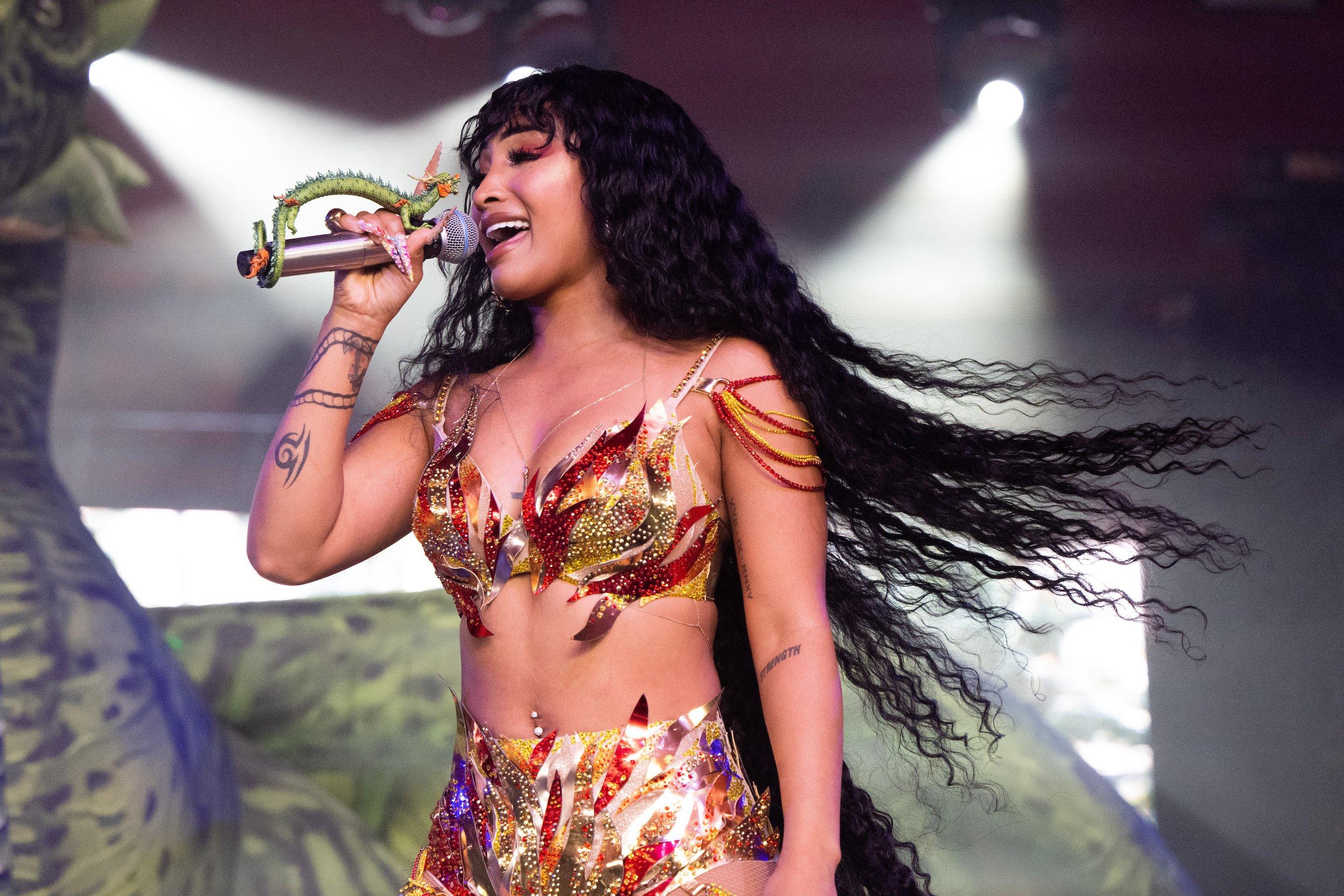
Photo: Scott Dudelson/Getty Images for Coachella
list
8 Can't-Miss Acts At Afro Nation Detroit 2024: Shenseea, Ayra Starr, Kizz Daniel & More
After a successful first year, Afro Nation Detroit returns to Bedrock's Douglass Site on Aug. 17 and 18. Get to know some of performers who are sure to be weekend highlights, from Uncle Waffles to Scorpion Kings.
Since its inception in 2019, Afro Nation has brought together the world's best and brightest entertainers in Afrobeats, amapiano, R&B, and hip-hop to perform on stages across the world. For the second year in a row, the festival takes over Bedrock's Douglass Site in Detroit — promising to continue its tradition of highlighting the best in Black music.
With its unique Detroit location, the festival bridges the gap between African music, global Black music, and the rich musical traditions that came out of Motown. In fact, the festival's site was once home to the first federally funded housing project for Black citizens in the city; Diana Ross and Smokey Robinson were among its residents.
Afro Nation Detroit offers as much history as it does global appeal, as its lineup is filled with buzzy rising stars and beloved veteran acts. Among those on the star-studded roster are Nigerian sensations Omah Lay, Rema and Asake, amapiano stars Kelvin Momo and TxC, and hitmakers Lil Wayne and PartyNextDoor.
Of course, it wouldn't be a Detroit event without native rapper Kash Doll, who performs on Saturday. And she won't be the only Detroiter performing over the weekend: genre-bending soul singer Charity and DJ Donavan Glover will also be repping their city amid sounds from around the globe.
That's just a taste of the exciting performances scheduled to showcase the diversity of Black music in one of its influential cities. Below, get to know eight acts who you won't want to miss at the second edition of Afro Nation Detroit.
Ayra Starr
Sat., Aug. 17 (Lit Stage)
At the age of 22, Ayra Starr is already making history. In February, The Beninese-Nigerian singer was the youngest nominee in the inaugural Best African Music Performance Category at the 2024 GRAMMYs; and in June, her debut album, The Year I Turned 21 helped her become the first female Nigerian artist to debut on the Billboard 200 album chart.
Just before her Afro Nation appearance, Starr added another first to her resume: she became the first Afrobeats singer to be part of Amazon Music's Breakthrough Artist program. The honor aligned with the release of her Amazon Music documentary, Dare to Dream, which chronicles her rise to global fame. There's no doubt that Ayra Starr will offer a showstopping performance that proves why she's such an acclaimed artist to watch.
Uncle Waffles
Sat., Aug. 17 (Piano People Stage)
Often regarded as the "princess of amapiano," Uncle Waffles is one of the genre's most forward-facing talents. In less than five years, the internationally recognized DJ/producer has been listed on TikTok's inaugural Visionary Voices Africa List, been nominated at the BET Awards and MOBO Awards; this year, she became the first amapiano artist to perform at Coachella.
Her talents have also earned Uncle Waffles co-sign from Beyoncé — whose Renaissance World Tour homage to Uncle Waffles' "Tanzania" nearly brought the star to tears — Drake, Ciara, and Missy Elliott. Needless to say, Uncle Waffles is an act that you won't want to miss at AfroNation Detroit.
Read More: 11 Women Pushing Amapiano To Global Heights: Uncle Waffles, Nkosazana Daughter, & More
2woBunnies
Sat., Aug. 17 (Piano People Stage)
Think Daft Punk, but amapiano. Masked South African DJ duo 2woBunnies decided on the concept of anonymity as a way to create intrigue about their unique take on the genre, and let their music do the rest.
Though it has only been two years since their debut, they have done just that, from garnering more than 1 million likes on TikTok to performing sets everywhere from Dubai to Australia. Following first-time performances in major cities like Paris and Toronto, they'll make their Detroit debut next — and you don't want to miss the excitement they'll bring to Afro Nation.
Kizz Daniel
Sat., Aug. 17 (Lit Stage)
Since releasing his breakout single, "Woju," in 2015, Kizz Daniel has been a trailblazer in bringing Afrobeats to the world. And nearly 10 years in, he's continuing to deliver songs that resonate — including a hit remix of "Twe Twe" with fellow Nigerian star Davido.
Kizz Daniel's Afro Nation performance comes on the heels of another fiery remix, as he recently hopped on Nigerian artist Kaestyle's "My Dealer." He'll have plenty of new songs from his own catalog to bring to his set, too, including his latest single, "Double,” and EP TZA. Whether new or old, Kizz Daniel will be ready to give his crowd a lesson in Afrobeats.
Shenseea
Sun., Aug. 18 (Lit Stage)
In May, Shenseea released her sophomore studio album, Never Gets Late Here, which solidified the GRAMMY nominee as one of Jamaica's most promising rising stars. "Hit & Run", the album's single, was warmly received throughout the Caribbean, reaching No. 1 on several charts across Antigua and Barbuda, Turks and Caicos, Bermuda, Barbados, Trinidad and Tobago, and many other countries in the region.
Fittingly, Shenseea first brought Never Gets Late Here to life on stages across the Caribbean, where her onstage energy matched the hyped crowds. She stops by Afro Nation Detroit just after kicking off her Never Gets Late Here North American Tour in Chicago on Aug. 16, so she'll surely be ready to show festgoers why she's so beloved in her home country and beyond.
Amaarae
Sun., Aug. 18 (Lit Stage)
To say Amaarae is in demand would be an understatement. Sabrina Carpenter personally requested the Ghanaian American artist as an opening act for her forthcoming tour; Childish Gambino featured her on his new album, Bando Stone & the New World, and its accompanying tour; and she recently made history as the first Ghanaian artist to perform on NPR's Tiny Desk.
Her latest release, roses are red, tears are blue — A Fountain Baby Extended Play, are equal parts Afropop and alté, a fusion genre that originated in West Africa and combines hip-hop, R&B and Afrobeats. Her sweet, alluring nature signifies her place as one of the most exciting new talents to take over pop. Don't miss the opportunity to see a new global pop girl take center stage.
Scorpion Kings
Sun., Aug. 18 (Piano People Stage)
DJ Maphorisa and Kabza De Small — often referred to as the "godfathers" of amapiano — are the men behind Scorpion Kings. Already established in their own right and respected in South Africa's dance scene, the two have been inextricably linked to the global rise of the genre, and the celebration of South African and African music across the globe.
Last month, the pair performed alongside the who's who in amapiano — Kelvin Momo, Oskido, DJ Tunez, DJ Moma, Aquite, and the Descendants — in Central Park, making history as the first amapiano performance in the famed New York landmark. The duo is sure to keep the party going with their signature flair in Detroit.
DJ Moma
Sun., Aug. 18 (Piano People Stage)
There is a good chance that you know of DJ Moma. In addition to being one of the founding members of Everyday People, the Sudanese American DJ has been playing African music in venues throughout the country and world for over a decade.
His blend of African and Diasporic music, and incorporation of soca, amapiano, and dancehall are a celebration of everything that is global Black music. It is more than music to him, but a way to bring Diasporic musical traditions to the forefront, in an effort to connect and unify People of the African Diaspora across the globe. His mission will make for an Afro Nation Detroit moment that is as meaningful as it is joyful — a combination that's exactly what the fest is all about.
More News About African Music

Stonebwoy On His "Inner Quest" To Showcase Authentic Ghanaian Sound

Mic Monsta Performs "Local Lokito" | Global Spin

Rising Afrobeats Star Oxlade Is Ready To Go Global On 'Oxlade From Africa'

Amapiano's Decade-Long Journey To Global Dominance: The Sound Redefining Club Music Worldwide

10 Artists Essential To Ghanaian Hiplife: Reggie Rockstone, Sarkodie, Mzbel & More
